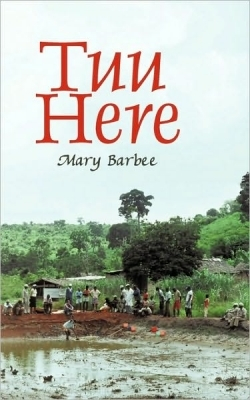Tuu Here
In Tuu Here, Mississippi native Mary Duncan is a young Tulane University graduate serving a two-year Peace Corps stint in Cameroon in the early 1970’s. She is twelve hours from any commercial center, without electricity or running water, helping the locals build fish ponds to secure a source of protein. Tuu Here means “the fish are here” in the native Vute tongue.
As is the case with many Peace Corps volunteers, Duncan is naïve about the people, the land and the culture yet with assistance from the French-speaking Muslims, she gradually begins to acclimate. She walks the rutted roads, fights elephant grass, and withstands the mud of wet season and dry season dust. Her hard work is rewarded in surprising ways; not only by helping build successful fish farms but also weight loss, new friends, and a stronger sense of self worth.
Not long after she arrives, farmers seek her out to learn more about the fish ponds but also, the men are equally quick to demonstrate their interest in her sexually, including her boss, Steve. With surprising maturity, she realizes that relationships made during her stay in Cameroon will not likely survive.
Yet, this young woman has much to learn. To her horror, when she mentions that someone has stolen fish from one of the ponds, the guilty man is quickly restrained and whipped. At one point she writes, “Now, I know why the baby does not speak. It has not lived in the neighborhood long enough to understand the consequences of his words. I suddenly feel very old and wiser. I had no idea one could feel this old at 23. I long for the United States where I can be a child again in my twenties.”
Unfortunately, the writing is stilted and jerky and lacks descriptions of body language and emotional context. “This guy does not smile when he talks. He really is not that friendly. I guess I should cut the small talk. He is obviously not interested in anything that I have to say about the differences in tastes in our two cultures.”
Yet, the exotic tale of an American woman’s insights and experiences in a foreign culture keeps the pages turning. The simplicity of the voice makes Duncan a character who is easy to embrace for her youth and resilience. With a thorough editing, and better use of literary tools, this fictionalized story of the author’s experiences could come to life and sing a powerful coming of age song of a Peace Corps volunteer.
Readers who enjoy memoir-type writings, exotic settings, and the altruistic endeavors of an American volunteer in an under-privileged country will find this book a delight.
Reviewed by
Dawn Goldsmith
Disclosure: This article is not an endorsement, but a review. The publisher of this book provided free copies of the book and paid a small fee to have their book reviewed by a professional reviewer. Foreword Reviews and Clarion Reviews make no guarantee that the publisher will receive a positive review. Foreword Magazine, Inc. is disclosing this in accordance with the Federal Trade Commission’s 16 CFR, Part 255.

